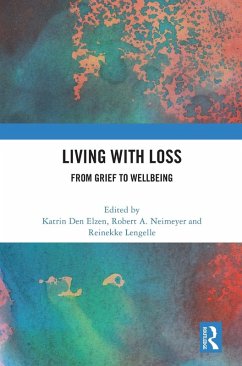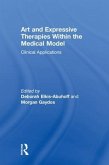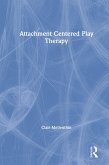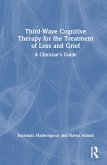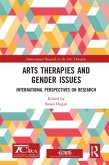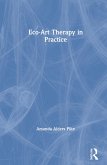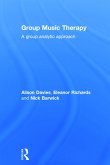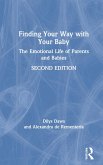Living with Loss
From Grief to Wellbeing
Herausgeber: Den Elzen, Katrin; Lengelle, Reinekke; Neimeyer, Robert
Living with Loss
From Grief to Wellbeing
Herausgeber: Den Elzen, Katrin; Lengelle, Reinekke; Neimeyer, Robert
- Gebundenes Buch
- Merkliste
- Auf die Merkliste
- Bewerten Bewerten
- Teilen
- Produkt teilen
- Produkterinnerung
- Produkterinnerung
The volume offers the latest research on adapting to and understanding bereavement and non-death losses. It evaluates the effectiveness of a range of therapeutic approaches that facilitate the integration of loss. The chapters were originally published as two special issues in British Journal of Guidance and Counselling.
Andere Kunden interessierten sich auch für
![Art and Expressive Therapies within the Medical Model Art and Expressive Therapies within the Medical Model]() Art and Expressive Therapies within the Medical Model186,99 €
Art and Expressive Therapies within the Medical Model186,99 €![Attachment Centered Play Therapy Attachment Centered Play Therapy]() Clair MellenthinAttachment Centered Play Therapy189,99 €
Clair MellenthinAttachment Centered Play Therapy189,99 €![Third-Wave Cognitive Therapy for the Treatment of Loss and Grief Third-Wave Cognitive Therapy for the Treatment of Loss and Grief]() Faramarz HashempourThird-Wave Cognitive Therapy for the Treatment of Loss and Grief174,99 €
Faramarz HashempourThird-Wave Cognitive Therapy for the Treatment of Loss and Grief174,99 €![Arts Therapies and Gender Issues Arts Therapies and Gender Issues]() Arts Therapies and Gender Issues186,99 €
Arts Therapies and Gender Issues186,99 €![Eco-Art Therapy in Practice Eco-Art Therapy in Practice]() Amanda Alders PikeEco-Art Therapy in Practice186,99 €
Amanda Alders PikeEco-Art Therapy in Practice186,99 €![Group Music Therapy Group Music Therapy]() Alison DaviesGroup Music Therapy186,99 €
Alison DaviesGroup Music Therapy186,99 €![Finding Your Way with Your Baby Finding Your Way with Your Baby]() Dilys DawsFinding Your Way with Your Baby150,99 €
Dilys DawsFinding Your Way with Your Baby150,99 €-
-
-
The volume offers the latest research on adapting to and understanding bereavement and non-death losses. It evaluates the effectiveness of a range of therapeutic approaches that facilitate the integration of loss. The chapters were originally published as two special issues in British Journal of Guidance and Counselling.
Hinweis: Dieser Artikel kann nur an eine deutsche Lieferadresse ausgeliefert werden.
Hinweis: Dieser Artikel kann nur an eine deutsche Lieferadresse ausgeliefert werden.
Produktdetails
- Produktdetails
- Verlag: Taylor & Francis Ltd (Sales)
- Seitenzahl: 252
- Erscheinungstermin: 28. Oktober 2024
- Englisch
- Abmessung: 244mm x 170mm x 16mm
- Gewicht: 626g
- ISBN-13: 9781032608280
- ISBN-10: 1032608285
- Artikelnr.: 70975184
- Herstellerkennzeichnung
- Libri GmbH
- Europaallee 1
- 36244 Bad Hersfeld
- gpsr@libri.de
- Verlag: Taylor & Francis Ltd (Sales)
- Seitenzahl: 252
- Erscheinungstermin: 28. Oktober 2024
- Englisch
- Abmessung: 244mm x 170mm x 16mm
- Gewicht: 626g
- ISBN-13: 9781032608280
- ISBN-10: 1032608285
- Artikelnr.: 70975184
- Herstellerkennzeichnung
- Libri GmbH
- Europaallee 1
- 36244 Bad Hersfeld
- gpsr@libri.de
Katrin Den Elzen is Research Associate at Curtin University, Perth, Australia and a Writing- for- wellbeing lecturer for graduate students in expressive art therapies, Murdoch University, Perth, Australia. She has written a grief memoir and works as a grief counselor and Writing- for- wellbeing facilitator. Her most recent publication is Writing for Wellbeing: Theory, Research and Practice with Routledge (2023). Robert A. Neimeyer directs the Portland Institute for Loss and Transition, Oregon, USA; actively practices as a trainer and consultant; and has published over 600 articles and 35 books, most on grieving as a meaning- making process. He is also a Professor Emeritus of the University of Memphis, Tennessee, USA. His most recent books are New Techniques of Grief Therapy (2021, Routledge) and The Handbook of Grief Therapies (2023). Reinekke Lengelle is Associate Professor of Interdisciplinary Studies at Athabasca University, Canada and a researcher at The Hague University, The Netherlands. Her book Writing the Self in Bereavement: A Story of Love, Spousal Loss, and Resilience won the Best Book Award for Ethnography in 2021 and the Qualitative Inquiry Book Award in 2022.
Introduction - Living with loss 1. Narratives of experiences of presence in
bereavement: sources of comfort, ambivalence and distress 2. Supporting
bereaved students in higher education: student perspectives 3. How are
worriers particularly sensitive to grief? Tonic immobility as a mediating
factor 4. Determination of resilience factors in individuals who tested
COVID-19 positive 5. Grief and functional impairment following COVID-19
loss in a treatment-seeking sample: the mediating role of meaning 6. The
impact of expressive storytelling on grieving: how narrative writing can
help us actively and effectively process and reconcile the loss of a loved
one 7. These roots that bind us: using writing to process grief and
reconstruct the self in chronic illness 8. Healing wounds: exploring the
hyphen in son-father relations as an adult child of an alcoholic 9. Grief
tending through the wilderness: toward a poetic consciousness for adult
survivors of childhood trauma 10. Braiding western and eastern cultural
rituals in bereavement: an autoethnography of healing the pain of prolonged
grief 11. The literature of loss: elegy writing as a therapeutic strategy
for coping with grief 12. Grief memoirs and the reordering of life: on
resilience, loneliness, and writing 13. A tale of two widows: investigating
meaning-making and identity development through writing in the face of
grief 14. Compassion-focused grief therapy 15. Meaning-oriented narrative
reconstruction: navigating the complexities of bereaved families 16.
Assimilation in bereavement: charting the process of grief recovery in the
case of Sophie 17. Rewriting grief following bereavement and non-death
loss: a pilot writing-for-wellbeing study
bereavement: sources of comfort, ambivalence and distress 2. Supporting
bereaved students in higher education: student perspectives 3. How are
worriers particularly sensitive to grief? Tonic immobility as a mediating
factor 4. Determination of resilience factors in individuals who tested
COVID-19 positive 5. Grief and functional impairment following COVID-19
loss in a treatment-seeking sample: the mediating role of meaning 6. The
impact of expressive storytelling on grieving: how narrative writing can
help us actively and effectively process and reconcile the loss of a loved
one 7. These roots that bind us: using writing to process grief and
reconstruct the self in chronic illness 8. Healing wounds: exploring the
hyphen in son-father relations as an adult child of an alcoholic 9. Grief
tending through the wilderness: toward a poetic consciousness for adult
survivors of childhood trauma 10. Braiding western and eastern cultural
rituals in bereavement: an autoethnography of healing the pain of prolonged
grief 11. The literature of loss: elegy writing as a therapeutic strategy
for coping with grief 12. Grief memoirs and the reordering of life: on
resilience, loneliness, and writing 13. A tale of two widows: investigating
meaning-making and identity development through writing in the face of
grief 14. Compassion-focused grief therapy 15. Meaning-oriented narrative
reconstruction: navigating the complexities of bereaved families 16.
Assimilation in bereavement: charting the process of grief recovery in the
case of Sophie 17. Rewriting grief following bereavement and non-death
loss: a pilot writing-for-wellbeing study
Introduction - Living with loss 1. Narratives of experiences of presence in
bereavement: sources of comfort, ambivalence and distress 2. Supporting
bereaved students in higher education: student perspectives 3. How are
worriers particularly sensitive to grief? Tonic immobility as a mediating
factor 4. Determination of resilience factors in individuals who tested
COVID-19 positive 5. Grief and functional impairment following COVID-19
loss in a treatment-seeking sample: the mediating role of meaning 6. The
impact of expressive storytelling on grieving: how narrative writing can
help us actively and effectively process and reconcile the loss of a loved
one 7. These roots that bind us: using writing to process grief and
reconstruct the self in chronic illness 8. Healing wounds: exploring the
hyphen in son-father relations as an adult child of an alcoholic 9. Grief
tending through the wilderness: toward a poetic consciousness for adult
survivors of childhood trauma 10. Braiding western and eastern cultural
rituals in bereavement: an autoethnography of healing the pain of prolonged
grief 11. The literature of loss: elegy writing as a therapeutic strategy
for coping with grief 12. Grief memoirs and the reordering of life: on
resilience, loneliness, and writing 13. A tale of two widows: investigating
meaning-making and identity development through writing in the face of
grief 14. Compassion-focused grief therapy 15. Meaning-oriented narrative
reconstruction: navigating the complexities of bereaved families 16.
Assimilation in bereavement: charting the process of grief recovery in the
case of Sophie 17. Rewriting grief following bereavement and non-death
loss: a pilot writing-for-wellbeing study
bereavement: sources of comfort, ambivalence and distress 2. Supporting
bereaved students in higher education: student perspectives 3. How are
worriers particularly sensitive to grief? Tonic immobility as a mediating
factor 4. Determination of resilience factors in individuals who tested
COVID-19 positive 5. Grief and functional impairment following COVID-19
loss in a treatment-seeking sample: the mediating role of meaning 6. The
impact of expressive storytelling on grieving: how narrative writing can
help us actively and effectively process and reconcile the loss of a loved
one 7. These roots that bind us: using writing to process grief and
reconstruct the self in chronic illness 8. Healing wounds: exploring the
hyphen in son-father relations as an adult child of an alcoholic 9. Grief
tending through the wilderness: toward a poetic consciousness for adult
survivors of childhood trauma 10. Braiding western and eastern cultural
rituals in bereavement: an autoethnography of healing the pain of prolonged
grief 11. The literature of loss: elegy writing as a therapeutic strategy
for coping with grief 12. Grief memoirs and the reordering of life: on
resilience, loneliness, and writing 13. A tale of two widows: investigating
meaning-making and identity development through writing in the face of
grief 14. Compassion-focused grief therapy 15. Meaning-oriented narrative
reconstruction: navigating the complexities of bereaved families 16.
Assimilation in bereavement: charting the process of grief recovery in the
case of Sophie 17. Rewriting grief following bereavement and non-death
loss: a pilot writing-for-wellbeing study

